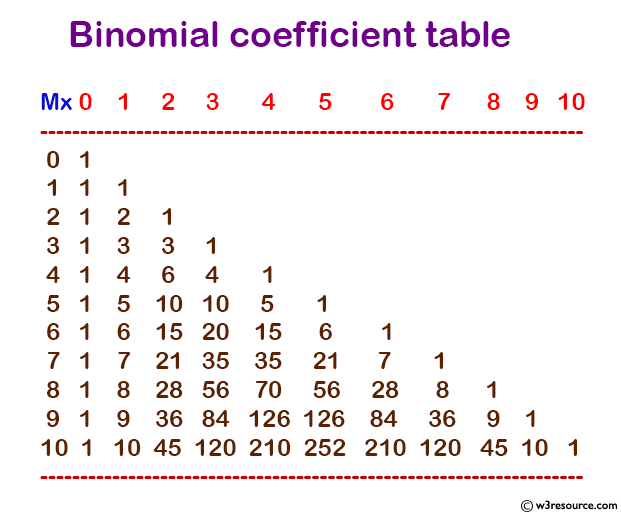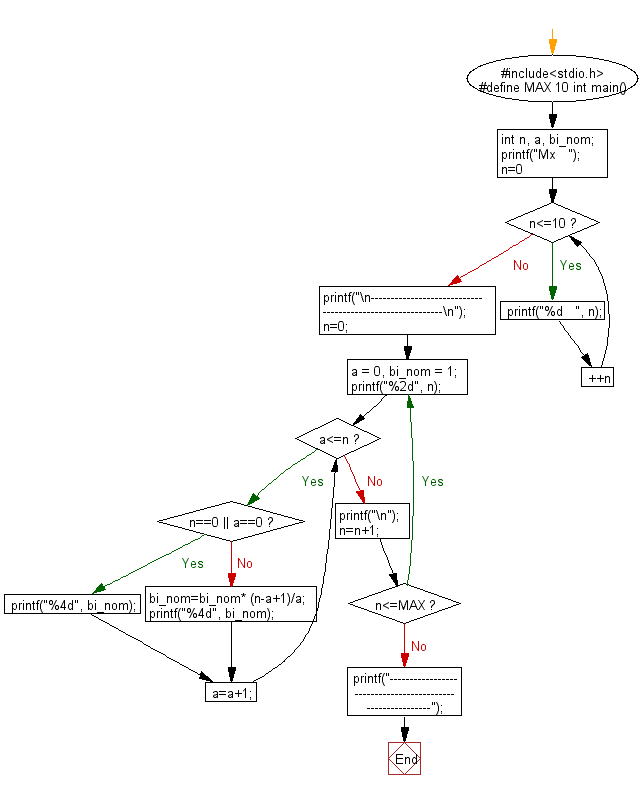C Exercises: Print a binomial coefficient table
C Basic Declarations and Expressions: Exercise-69 with Solution
Write a C program to print a binomial coefficient table.
Pictorial Presentation:

Sample Solution:
C Code:
#include<stdio.h>
#define MAX 10
int main()
{
int n, a, bi_nom;
printf("Mx ");
for (n=0; n<=10; ++n)
printf("%d ", n);
printf("\n----------------------------------------------------------\n");
n=0;
do
{
a = 0, bi_nom = 1;
printf("%2d", n);
while(a<=n)
{
if(n==0 || a==0)
printf("%4d", bi_nom);
else
{
bi_nom=bi_nom* (n-a+1)/a;
printf("%4d", bi_nom);
}
a=a+1;
}
printf("\n");
n=n+1;
}
while(n<=MAX);
printf("----------------------------------------------------------");
}
Sample Output:
Mx 0 1 2 3 4 5 6 7 8 9 10 ---------------------------------------------------------- 0 1 1 1 1 2 1 2 1 3 1 3 3 1 4 1 4 6 4 1 5 1 5 10 10 5 1 6 1 6 15 20 15 6 1 7 1 7 21 35 35 21 7 1 8 1 8 28 56 70 56 28 8 1 9 1 9 36 84 126 126 84 36 9 1 10 1 10 45 120 210 252 210 120 45 10 1 ----------------------------------------------------------
Flowchart:

C programming Code Editor:
Contribute your code and comments through Disqus.
Previous:Write a C program to evaluate the equation y=xn when n is a non-negative integer.
Next: Write a C program to print the alphabet set in decimal and character form.
What is the difficulty level of this exercise?
Test your Programming skills with w3resource's quiz.
C Programming: Tips of the Day
Static variable inside of a function in C
The scope of variable is where the variable name can be seen. Here, x is visible only inside function foo().
The lifetime of a variable is the period over which it exists. If x were defined without the keyword static, the lifetime would be from the entry into foo() to the return from foo(); so it would be re-initialized to 5 on every call.
The keyword static acts to extend the lifetime of a variable to the lifetime of the programme; e.g. initialization occurs once and once only and then the variable retains its value - whatever it has come to be - over all future calls to foo().
Ref : https://bit.ly/3fOq7XP
- New Content published on w3resource:
- HTML-CSS Practical: Exercises, Practice, Solution
- Java Regular Expression: Exercises, Practice, Solution
- Scala Programming Exercises, Practice, Solution
- Python Itertools exercises
- Python Numpy exercises
- Python GeoPy Package exercises
- Python Pandas exercises
- Python nltk exercises
- Python BeautifulSoup exercises
- Form Template
- Composer - PHP Package Manager
- PHPUnit - PHP Testing
- Laravel - PHP Framework
- Angular - JavaScript Framework
- Vue - JavaScript Framework
- Jest - JavaScript Testing Framework
